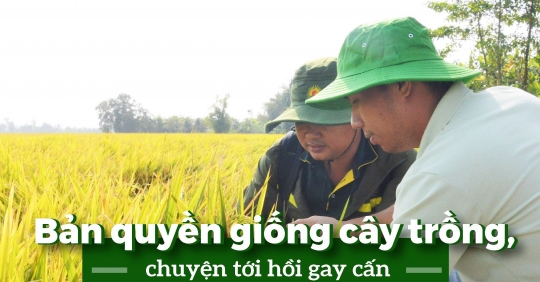Mixed Rice Seed Market
With a rice acreage of more than 3.8 million hectares/year, farmers in the Mekong Delta need a huge amount of seed for sowing, about 400,000 tons per year. This is calculated according to the recommendations of the agricultural industry with a sowing density of 100 – 120kg/ha. While Mekong Delta farmers still have the habit and practice of thick sowing, the actual amount of rice seed needs much more than this number.
With more than 700,000 ha/year, Kien Giang is the province with the largest rice cultivation area in the Mekong Delta. The demand for certified seed rice for production is 60,000 to 70,000 tons/year. Mr. Ngo Dinh Thuc, director of the Kien Giang Agro-Forestry-Fisheries Seed Center, said the rice seed market is becoming increasingly competitive and chaotic.
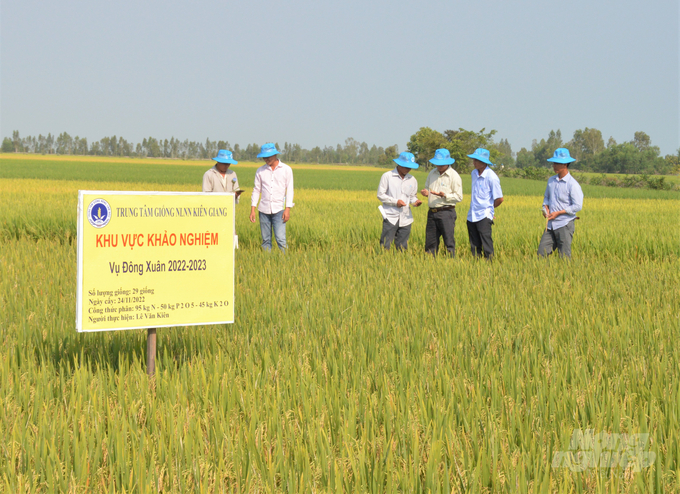
Many argue that seed copyright protection also creates a monopoly situation in part, increasing seed prices and ultimately suffering farmers. Picture: Trung Chanh.
Real business entities need to buy copyrights, share copyrights, thereby inflating the selling price. Organizations and individuals doing business in a row, selling “white sack rice” without paying royalties, selling at low prices, simply attracting customers. This results in very limited production of quality rice varieties that meet the prescribed standards for rice varieties.
There are currently three main varieties of rice in the Mekong Delta, which are produced by farmers over a large area, namely OM5451, OM18 and Dai Thom 8. Including Loc Group Joint Stock Company
Heaven bought it owns the copyright of 2 varieties, OM5451 and OM18. Vietnam Seed Group Joint Stock Company (Vinaseed) owns the copyright of Dai Thom 8 rice variety.
Mr Ngo Dinh Thuc, director of Kien Giang Seed Center for Agro-forestry and Fisheries, said the unit has currently contacted but not shared with the copyright owner for Dai Thom 8 and ST24, ST25 rice varieties. These are rice varieties occupying a large area in the structure of the rice varieties produced in Kien Giang.
“Because copyright was not shared to have standard rice varieties ST24 and ST25
Delivery to farmers for production, we now have to buy through third parties, increasing the cost of rice seed, but the last loser is the farmer,” said Mr. Le Huu Toan, deputy director of the Ministry of Agriculture and Rural Development Kien Giang Agriculture and shared rural development.
This is because large corporations and enterprises own the copyright of rice varieties, but do not share the copyright with entities such as seed centers, rice seed production and business units, resulting in the situation of “seed covered seeds”, white rice”, rice as “paddy rice “packaged and labeled, rice being offered for sale as “high quality rice” is becoming more common as floating seeds appear.
This is a fraudulent way of doing business, doing business, everyone knows it is a bag of rice seeds, but deliberately evading the law. While the government leadership, the profession’s oversight of plant variety management, faces many difficulties, it cannot even be sanctioned.
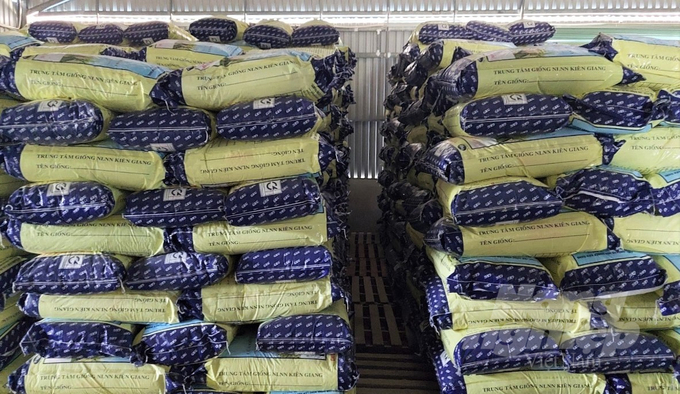
The supply of high-quality, certified seed is limited, while copyright protection sometimes makes it difficult for farmers to access high-quality seed. Picture: Trung Chanh.
According to Mr. Thuc, “White Bag Rice Seed” is not tested for seed quality, people only need to select beautiful rice fields, then cut, dry and clean, and then pack them for sale, so the price is much cheaper compared to rice varieties follow the process , Quality assurance. Farmers who purchase white bag rice seed at a cheap price for production not only risk losses from reduced yields and rice quality, but also create chaotic and unfair competition in the rice seed market. The entities that produce and trade rice seeds according to government regulations will face difficulties if they cannot compete on price.
At present, the sharing of copyright of rice seeds is carried out according to the Intellectual Property Law, there is no mandatory rule on sharing, but it is up to the copyright owner to choose to share or not. Units wishing to share copyright must negotiate with the owner, and depending on the variety and market demand, the owner will offer different franchise prices. If the organization or individual owns it but wants to be exclusive and not share it, they must accept it.
Company “rude” copyright, farmers suffer?
Mr. Nguyen Van Thuan, Director of Vietnam Rice Company Limited (Vinarice), said: As a member entity of Vinaseed, the company’s mission is to specialize in the production of high-quality rice seed and its supply to the market. At present, the provinces in the Mekong Delta focus on building production models, large rice fields that meet the prescribed standards and meet the raw material areas for enterprise export processing. For these models, the first requirement is to produce certified seed with a standard production batch certificate.
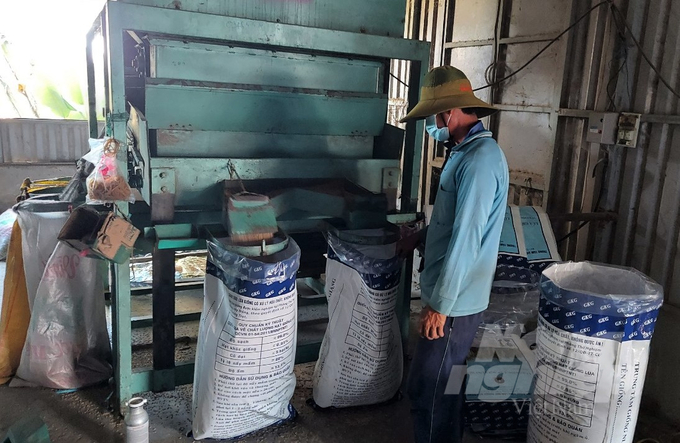
The lack of high-quality rice seeds not only increases the price, but also creates favorable conditions for fraudulent business entities to “muddy the country.” Picture: Trung Chanh.
Regarding Dai Thom 8 rice variety, which Vinaseed owns the copyright, Mr. Thuan said there is now a new generation of Dai Thom 8 varieties that have been researched and have evolved more genes to increase pest and disease resistance increase and support production more efficiently. The Southern Seed Joint Stock Company (SSC) produces and supplies for the market in the central and northern regions. Vinarice is responsible for the main market in the Mekong Delta.
“Last time, in the Mekong Delta, there were also some entities that asked to share the copyright of the Dai Thom 8 rice variety, but they did not agree to any entity, not the one they wanted to monopolize, but to ensure the quality the rice variety. Due to the genetic purity of the variety, it is necessary to select and reproduce regularly and continuously so that the variety is not degraded. Therefore, Vinarice does not currently supply or share the original 8-grade Dai Thom rice variety for breeding units. We only produce and supply the certified 8-grade Dai Thom seed for farmers to produce commercial rice.”
Nguyen Van Do, chief inspector of the Hau Giang Ministry of Agriculture and Rural Development, said the tendency for big corporations and companies to monopolize the ownership of some rice varieties is causing goods to be absorbed in the season due to supply shortages. After each sale, the seed price increases. “So why don’t companies share copyrights with places to expand breeding, increase supply, and meet people’s production needs? Is there a monopoly problem for profit?” Mr. Do asked the question.
The lack of high-quality rice seeds not only increases the price, but also creates favorable conditions for fraudulent business entities to “muddy the country.”
“If the supply is insufficient, farmers will accept the purchase of ‘horizontal rice varieties’ packed in white bags labeled ‘raw rice’, making it difficult for inspectors to figure out that there is no basis for sanctions. Scammers also connect with local agricultural suppliers, taking orders from farmers, writing addresses and then delivering them straight to people’s homes. The inspectors can only check the dealer’s warehouse, but cannot visit every house for inspection,” said Mr.
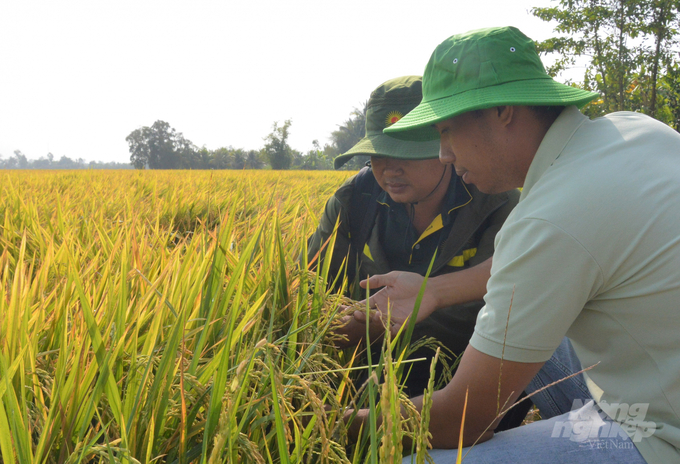
At present, many units and companies need to share the copyright of high-quality varieties of rice, but access is very difficult and troublesome because “crossing the river must follow the boat”, the unit owns the copyright of the seed. Picture: Trung Chanh.
Mr. Le Huu Toan, deputy director of the Ministry of Agriculture and Rural Development of Kien Giang, said that at present, Kien Giang has only agreed to share the copyright of Loc Troi Group’s OM18 and OM5451 rice varieties. The remaining varieties from farmers with high demand and large production areas such as Dai Thom 8, ST24, ST25 have not yet been agreed.
At present, the ST24 and ST25 fragrant rice varieties are widely used by farmers in the rice-shrimp crop rotation and are produced according to the organic rice model. Since this type of rice is not only well adapted to the soil of shrimp farming, but also gives good quality rice, the price is very high.
The agricultural sector of Kien Giang Province has been contacting the copyright holder of ST24 and ST25 rice varieties for many years to agree to copyright sharing, but so far has not been signed. The owner’s application when granting a franchise can only be sold to farmers in the province, not to other provinces. This is a very unreasonable constraint as the entity that sells rice seeds cannot verify where the farmers buy their seeds. In addition, with a copyright split, the franchisee must pay a fee for each kilogram of rice seed sold.
In order not to violate the copyright in the seed business, the rice seed production and trading units must be shared and concessioned by the owner. However, large corporations and companies often tend to increase sales of exclusive seeds. Copyright sharing is very limited, difficult, and comes with complicated restrictions. The price for sharing, franchising is also not regulated, but “voluntarily”, self-negotiated.

